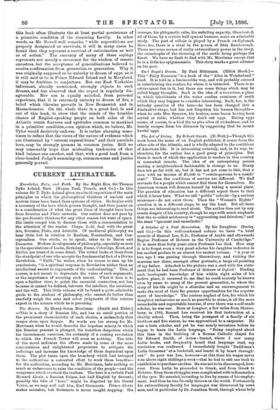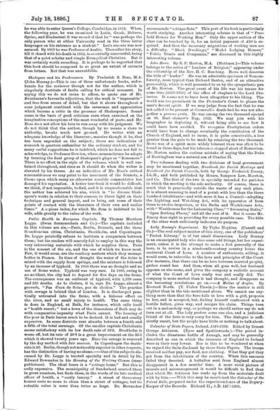A Scholar of a Past Generation. By his Daughter. (Seeley
and Co.)—In this well-condensed volume we have "a brief memoir of Samuel Lee, D.D., Professor of Arabic and afterwards- Regius Professor of Hebrew in the University of Cambridge.”, It is more than forty years since Professor Lee died. How easy it is to forget even a very great scholar his daughter indicates in her modest preface to an almost too modest volume. "A year or two ago I was passing through Shrewsbury, and visiting the museum saw there, amongst other portraits, a large oil-painting of my father. Attached to the picture was a card with the state- ment that he had been Professor of Hebrew at Oxford ! Finding such inadequate knowledge of him within eight miles of his native place, it occurred to use that he could scarcely be known even by name to many of the present generation, to whom the story of his life might be a stimulus and an encouragement to make the most of their far greater opportunities for the acquire- ment of knowledge." The curious neglect of Lee, for which his daughter endeavours as much as possible to atone, is all the more remarkable and regrettable because, if ever there was a self-made scholar, he was one. Born at Longnor, a few miles from Shrews- bury, in 1783, Samuel Lee received his first instruction at a' charity school. Then, being the youngest of a family of six brothers and five sisters, he was apprenticed to a carpenter. He was a born scholar, and yet he was nearly seventeen before he began to learn the Latin language. "Being employed about this time in the building of a Roman Catholic chapel for Sir Edward Smith, of Acton - burnel, where I saw many Latin books, and frequently heard that language read, my resolution was confirmed. I immediately bought Ruddiman's Latin Grammar ' at a bookstall, and learnt it by heart through- out." So poor was Lee, however—at this time his wages nevez rose above eight shillings a week—that he had to sell one book to enable him to purchase another. He was not to be discouraged, how- ever. From Latin he proceeded to Greek, and from Greek to Hebrew. Even these struggles were complicated with inflammation of the eyes. He married, intending to live by means of his employ. ment. And then he was literally thrown on the world. Fortunately his extraordinary faculty for languages was discovered by some men, and in particular by Dr. Jonathan Scott, through whose help' he was able to enter Queen's College, Cambridge, in 1813. When, the following year, he was examined in Latin, Greek, Hebrew, Syriac, and Hindustani it was recor&d that he "was perhaps the only person who at either University read in the three latter languages on his entrance as a student." Lee's success was now assured. By 1819 he was Professor of Arabic. Thereafter his story, till it closed with his death in 1852, is essentially uneventful, being that of a quiet scholar and simple Evangelical Christian. But it was certainly worth recording. It is perhaps to be regretted that this book should be composed to so great an extent of extracts from letters. But that was unavoidable.



































 Previous page
Previous page